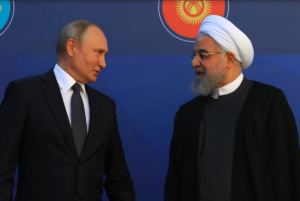By Paul Miller

(JNS) Policy towards Iran represents a particularly complex item on the Biden administration’s agenda. The administration has expressed solidarity with Iranian protesters as they face a harsh crackdown, but at the same time, President Joe Biden has long sought to revive the 2015 Iran nuclear deal.
The debate surrounding Iran cannot be viewed in isolation. It is intimately connected to Washington’s approach to another rogue regime—Russia—particularly in light of the recent warming relations between Moscow and Tehran.
On Tuesday, British Defense Minister Ben Wallace accused Russia of planning to provide Iran with advanced military components in exchange for hundreds of drones. This comes after U.S. National Security Council Spokesman John Kirby warned on Dec. 9 that the relationship between Russia and Iran is becoming “a full-scale defense partnership.” Moscow, he said, is offering Tehran “an unprecedented level of military and technical support” in exchange for drones and possibly ballistic missiles. Indeed, when Russia bombarded Ukrainian cities in October, Iranian UAVs were used in the attacks. There is also the issue of Iran’s potential future purchase of Russia’s Sukhoi Su-35 fighter jet.
Meanwhile, in Jerusalem, a new government led by Prime Minister-designate Benjamin Netanyahu is about to take office. This would seem to increase the likelihood of an Israeli military strike on Iran—although outgoing Defense Minister Benny Gantz has said that Netanyahu will be “level-headed” on the issue. Already, Israel has warned that it will destroy Beirut’s international airport if it becomes a conduit for Iranian weapons smuggling.
All of these are important challenges. At the same time, however, it is incumbent upon the U.S. and Israel to pay close attention to the south Caucasus, an often-overlooked region in Eurasia that now has unprecedented significance in the context of the growing alliance between Iran and Russia.

In early November, Armenian Prime Minister Nikol Pashinyan held a meeting in Iran with President Ebrahim Raisi. During the meeting, Raisi highlighted the 43% growth in Armenian-Iranian trade in recent months, and the two nations agreed to develop a new transit corridor through Iran. Armenia expressed its willingness to cooperate with Iranian contractors without holding any tenders. These developments come after Iran opened a consulate in the Armenian city of Kapan without any political or economic justification.
As this relationship between Iran and Armenia grew, so did Iranian threats towards another of its neighbors—Armenia’s regional adversary Azerbaijan. Tehran’s Islamic Revolutionary Guard Corps (IRGC), a U.S.-designated foreign terrorist organization, held a large-scale military exercise in October dubbed “Mighty Iran” along the border with Azerbaijan.
Several days after the exercise, a video clip was aired on the Iranian state television channel Sahar, which is mainly viewed by ethnic Azerbaijanis. The video threatened Israel and Azerbaijan, saying, “Israel … don’t stray too far from your path, don’t dig your own grave with your own hands. … Iran declares this so that Azerbaijan knows and understands … anyone who looks at Iran the wrong way must be destroyed.”
The IRGC exercise mirrored similar Iranian military drills on the border with Azerbaijan in Oct. 2021. The drills were named “Conquerors of Khaybar,” a reference to a historic battle in the early years of Islam in which Muslims defeated a tribe of Jews.
These threats underscore Iran’s longstanding disdain for the interfaith alliance between its fellow Shiite Muslim-majority country Azerbaijan and the Jewish state of Israel.
In November, while Armenia was ramping up ties with Iran, Azerbaijan’s parliament took the historic step of initiating the process of opening an embassy in Israel—making it the first Shiite Muslim-majority country to do so.
Armenia’s connections with Russia have also come under scrutiny. On Nov. 14, newly announced U.S. Treasury Department sanctions on entities providing technological support to Russia’s military included Armenia-based Milur Electronics, a recently launched affiliate of the Russian microelectronics company Milandr. According to the Treasury Department’s Office of Foreign Assets Control, Milur Electronics was initiated “for the purpose of placing orders from foreign factories, producing integrated microchips, and conducting overseas sales” for the benefit of Russia’s military-industrial complex.
The sanctioning of Milur Electronics follows the Treasury Department’s previous sanctions on several other Armenian companies, enacted in September, due to the companies’ support for the Russian military.
Armenia’s inclusion in the Treasury sanctions should be viewed in the context of the country’s historic role as a sanctions-buster for rogue regimes—including Iran. In 2012, Reuters reported that Armenian banks assisted Tehran with illicit finances that allowed the Iranians to “obfuscate payments to and from foreign clients and deceive Western intelligence agencies trying to prevent it from expanding its nuclear and missile programs.” Additionally, in 2019, the Treasury Department sanctioned Armenia-based Flight Travel LLC for its connections with Iran’s Mahan Air, which is linked to the IRGC.
Given the highly interconnected pieces of this geopolitical puzzle, the U.S. and Israel would be well-served to consider Armenia’s alignment with the rogue regimes in Iran and Russia when they consider their policy towards the south Caucasus and all of Eurasia.
*
Preceding provided by JNS.org. Paul Miller is a media and political consultant based in the Chicago area. His commentary has been published in USA Today, the New York Daily News, the New York Post, Newsweek and The Hill. Follow him on Twitter at @pauliespoint.